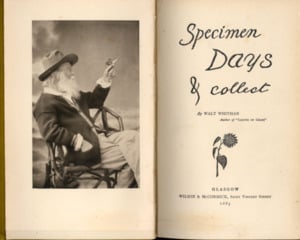
Boston Common—More of Emerson Walt Whitman
На этой странице вы найдете полный текст песни "Boston Common—More of Emerson" от Walt Whitman. Lyrxo предлагает вам самый полный и точный текст этой композиции без лишних отвлекающих факторов. Узнайте все куплеты и припев, чтобы лучше понять любимую песню и насладиться ею в полной мере. Идеально для фанатов и всех, кто ценит качественную музыку.

Oct. 10-13.—I spend a good deal of time on the Common, these delicious days and nights—every mid-day from 11.30 to about 1—and almost every sunset another hour. I know all the big trees, especially the old elms along Tremont and Beacon streets, and have come to a sociable silent understanding with most of them, in the sunlit air, (yet crispy-cool enough,) as I saunter along the wide unpaved walks. Up and down this breadth by Beacon street, between these same old elms, I walk'd for two hours, of a bright sharp February mid-day twenty-one years ago, with Emerson, then in his prime, keen, physically and morally magnetic, arm'd at every point, and when he chose, wielding the emotional just as well as the intellectual. During those two hours he was the talker and I the listener. It was an argument-statement, reconnoitring, review, attack, and pressing home, (like an army corps in order, artillery, cavalry, infantry,) of all that could be said against that part (and a main part) in the construction of my poems, "Children of Adam." More precious than gold to me that dissertion—it afforded me, ever after, this strange and paradoxical lesson; each point of E.'s statement was unanswerable, no judge's charge ever more complete or convincing, I could never hear the points better put—and then I felt down in my soul the clear and unmistakable conviction to disobey all, and pursue my own way. "What have you to say then to such things?" said E., pausing in conclusion. "Only that while I can't answer them at all, I feel more settled than ever to adhere to my own theory, and exemplify it," was my candid response. Whereupon we went and had a good dinner at the American House. And thenceforward I never waver'd or was touch'd with qualms, (as I confess I had been two or three times before.)
Комментарии (0)
Минимальная длина комментария — 50 символов.












